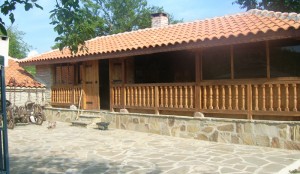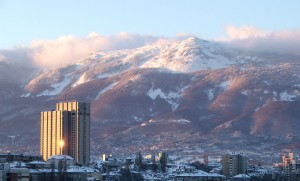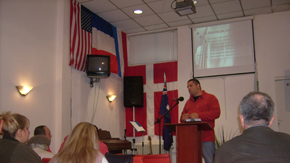School is in Session: Leadership Training Retreat for the Yambol Region
 The weekend of the 16-19th of September Cup and Cross Ministries, along with Yambol based Mission Maranatha, held a Leadership Training Retreat for the Yambol region. Ten delegates from the area were chosen to represent various areas of ministry including ministry to the villages, children, home groups, women, elderly and the military. Representatives from Spain and the United States were also present.
The weekend of the 16-19th of September Cup and Cross Ministries, along with Yambol based Mission Maranatha, held a Leadership Training Retreat for the Yambol region. Ten delegates from the area were chosen to represent various areas of ministry including ministry to the villages, children, home groups, women, elderly and the military. Representatives from Spain and the United States were also present.
Throughout our time together we were able to share personal experiences of ministry successes and growth areas in order to brainstorm through appropriate techniques and strategies to effectively resolve dilemmas in ministry. We discussed topics such as burnout and addressed how to nurture on-going motivation within each specific area of ministry.
At the conclusion of the training each delegate was encourage to take the resources which they had acquired and implement them into their specific areas of interest and take on the responsibility of training those whom are under their leadership.
Unfortunately we were unable to broadcast this training event live due to the remote location, but we are hoping to be able to make it available again in the near future, as we are planning our next event in which we will be reviewing leadership and communication styles. This series of training events is a part of our humble contribution toward the redevelopment of evangelical education in Bulgaria and the move from static training methodology to a dynamic strategy of empowering ministers throughout church-wide discipleship.
Liberty Leadership Seminar in Sofia
 The Liberty Leadership Seminar is beginning in the Bulgarian capital, Sofia under the teaching of Cup & Cross Ministries and partnering churches. This year the seminar will be held at the Elitsa Conference Center on the very top of the Vitosha Mountain which overlooks Sofia. The seminar is a week-long training event, which purposes the equipping of pastors and lay leaders within the Bulgarian Church of God. The seminar will be broadcasted LIVE on the internet according to the following schedule:
The Liberty Leadership Seminar is beginning in the Bulgarian capital, Sofia under the teaching of Cup & Cross Ministries and partnering churches. This year the seminar will be held at the Elitsa Conference Center on the very top of the Vitosha Mountain which overlooks Sofia. The seminar is a week-long training event, which purposes the equipping of pastors and lay leaders within the Bulgarian Church of God. The seminar will be broadcasted LIVE on the internet according to the following schedule:
July 3, 2009 12:00 PM ET: Opening Ceremony
July 4, 2009 7:00 AM ET: Liberty Leadership Seminar
July 5, 2009 2:00 AM ET: Morning Prayer Service
July 5, 2009 12:30 PM ET: Sunday Evening Worship
July 8, 2009 12:00 PM ET: Closing Events
Follow Cup & Cross on Twitter: http://twitter.com/bibliata
Watch Cup & Cross LIVE on uStream.TV: http://www.ustream.tv/channel/bibliata
Church of God Eastern Europe Missions: Leadership, Economics and Culture
By the end of 2003, in a dissertation proposal for the Church of God Theological Seminary, which dealt with Bulgarian American congregation from an evangelical point of view, we suggested that there is not just one single problem that contributes to the struggle of these congregations to establish themselves permanently in the North American culture. The research which followed in the next couple of years, further showed that a multilayered dilemma consisting of economical, cultural and leadership factors was the reason for both the success or failure for the church communities established by Christians emerging from a postcommunist context.
The research results confirmed the originally proposed problem in ministry, not only within Eastern European congregations in North America, but also by partnering ministries, research foundations and practicing colleagues working in the former Soviet satellites. The majority agreed, that not only the existence of the described tridementional dilemma, but the lack of a properly applied solution for it, constrained Christian congregations emerging from this context from reaching their potential in their respective communities. Rather symbolic in this discussion still remains the remark made by one of the leading Bulgarian experts in religious freedom and human rights, who elaborated our statement that Bulgarian evangelical congregations remain “beggars in a land of plenty” not only in America, but in the European Union as well, being held prisoners of their own mentality formed by the communist past.
Our work in the Bulgarian evangelical context, gave us the opportunity to extend this research beyond the North American scope into Bulgarian immigrant communities in Great Britain, Italy, Spain, Germany and Switzerland. The study repeatedly confirmed that these congregations struggled with the same dynamics we had proposed originally, which naturally led to applying the research model in a native Bulgarian context.
Our direct work in the past five years with over 400 hundred Bulgarian congregations from various evangelical denominations has confirmed that the problem of ministry for the majority of Bulgarian protestant churches both in and outside of Bulgaria, emerges from three groups of factors related to (1) leadership, (2) economics and (3) culture. Problems and solutions of this nature or their lack thereof, conforms the work of any missional organization ministering in an Eastern European context. The work of the Church of God European Mission makes no exception to this rule, as the proper timely address of these issues with applicable and unambiguous resolutions defines the very foundation of the state of the Bulgarian evangelical church in the beginning of the 21st century.
National Leadership Seminar for the Bulgarian Church of God Continues
 Levels 3-5 of the Leadership Seminar were presented on Saturday afternoon in the Gabrovo Church of God. The following topics were covered: 21 Laws of Leadership from a Biblical Perspective, 52 Leadership Principles of Jesus and 17 Laws of Teamwork for Churches. Plans have been made for the seminar to be held in Bourgas, Sofia, Samokov and Russe.
Levels 3-5 of the Leadership Seminar were presented on Saturday afternoon in the Gabrovo Church of God. The following topics were covered: 21 Laws of Leadership from a Biblical Perspective, 52 Leadership Principles of Jesus and 17 Laws of Teamwork for Churches. Plans have been made for the seminar to be held in Bourgas, Sofia, Samokov and Russe.
On Sunday we delivered a message entitled 10 Signs of the Last Days. This is a sermon accompanied by a powerful media presentation that informs of recent developments in Bible Prophecy and urges believers to prepare and stay ready for the final hour of Biblical eschatology.
After the morning service, we traveled south to meet with pastors in Kazanlak and Stara Zagora and reached the city of Dimitrovgrad located South of the Balkan Range. We were invited to speak to the hundreds of young people from Bulgaria, Ukrain, Russia and Molodva who had gathered there for a youth rally. As planned and expected we announced the release of the newest of our ministry websites – a GodTube like web community called Bibliata.TV.
Leadership Seminar for the Bulgarian Church of God
 A month ago, Cup & Cross Ministries visited the Samokov congregation pastored by Church of God National Overseer Alexander Todorov. Our team then left for the Salvation Church of God in the capital Sofia, to hold the first level of the Church Leadership Seminar. We have worked on this course for the past two years and designed it to serve as a tactical ministry training element in our national strategy for Church of God congregations. The first module included topics such as:
A month ago, Cup & Cross Ministries visited the Samokov congregation pastored by Church of God National Overseer Alexander Todorov. Our team then left for the Salvation Church of God in the capital Sofia, to hold the first level of the Church Leadership Seminar. We have worked on this course for the past two years and designed it to serve as a tactical ministry training element in our national strategy for Church of God congregations. The first module included topics such as:
(1) The leadership principles of Jesus
(2) Recognition, training and personal qualifications of a successful leader
(3) The principles of God’s timing
(4) Sacrifice, responsibility, investment and delegation
(5) The law of sowing and reaping
(6) The law of navigation
(7) Problem solving
(8) Psalm 23 for leaders
Subsequently, we released on the internet a 34-part series called the Successful Leader. Immediately after we held the course in Sofia, we began receiving invitations to hold the course in various locations in Bulgaria. As a result, we scheduled the first level of the leadership course with the churches in Sliven, Bourgas, Rousse and began planning its future presentation with the churches in Gabrovo, Yambol, and Samokov. We will be then returning to Samokov and Sofia in September to teach the second level of the Church Leadership Course in the Church of God congregations there.
Bulgarian Police Seizures of Church Properties in Conflict with Religious Freedom Commitments Action Inconsistent with Bulgaria’s OSCE Leadership Position
(Washington) – United States Helsinki Commission Chairman Rep. Christopher H. Smith (R-NJ) expressed alarm today over the widespread seizure of church properties in Bulgaria, which currently serves as Chair-in-Office of the Organization for Security and Cooperation in Europe. Bulgarian authorities raided more than 200 properties used by the alternative Bulgarian Orthodox synod for more than 10 years.
“I’m deeply distressed that Bulgarian police, with the apparent approval of the state prosecutor’s office, would forcibly seize some 200 churches and church-owned properties,” declared Chairman Smith. “While there may be disputes within the Bulgarian Orthodox Church, it is certainly not the proper role of government to interfere with internal church affairs. Unfortunately, Bulgarian authorities have abandoned neutrality and chosen sides, potentially endangering religious freedom.”
News reports indicate that throughout the day on July 21 Bulgarian police across the country expelled members of the alternative Orthodox synod of Bishop Inokentii, taking control of properties used by the synod. A longstanding church dispute between the Bulgarian Orthodox Church and the alternative synod has existed since they split in 1992.
The raids were discussed with Bulgarian Foreign Minister Solomon Passy, visiting Washington last week in his capacity as Chair-in-Office of the OSCE, in a meeting with Chairman Smith.
“Property issues should be decided by a court, not through legislative fiat or the unilateral actions of a state prosecutor and police,” said Chairman Smith. “Considering that Bulgaria is the current OSCE Chair-in-Office, I urge the Bulgarian Government to end this embarrassment, lead by example, and honor its OSCE human rights commitment toward religious freedom.”
“Bulgarian authorities should stop interfering and reinstate to the alternative synod full control of the properties,” Smith added. “The state should play no role in forcibly reconciling the two Orthodox communities.”
These raids are not the first time that the Bulgarian Government has favored one synod over the other. The December 2002 religion law enumerated detailed characteristics of the Bulgarian Orthodox Church, thereby establishing the synod of Patriarch Maxim above the alternative synod and all other religious communities. The law also laid the groundwork for the seizures by vesting government recognition and property rights with only the Bulgarian Orthodox Church. This provision works to the detriment of the alternative synod, placing it in a precarious and vulnerable position. The United States Helsinki Commission issued a report on the religion law, highlighting this problematic provision and other shortcomings.
The United States Helsinki Commission, an independent federal agency, by law monitors and encourages progress in implementing provisions of the Helsinki Accords. The Commission, created in 1976, is composed of nine Senators, nine Representatives and one official each from the Departments of State, Defense and Commerce.







